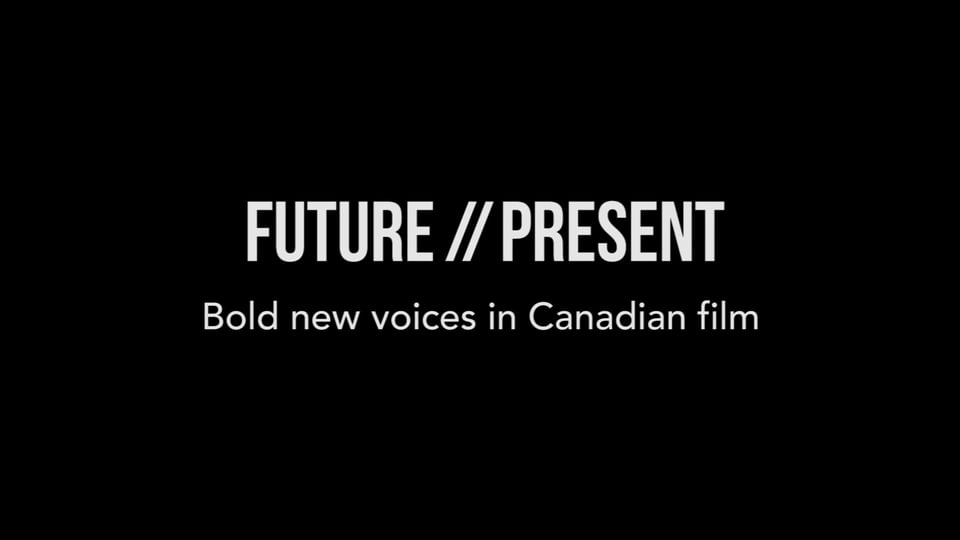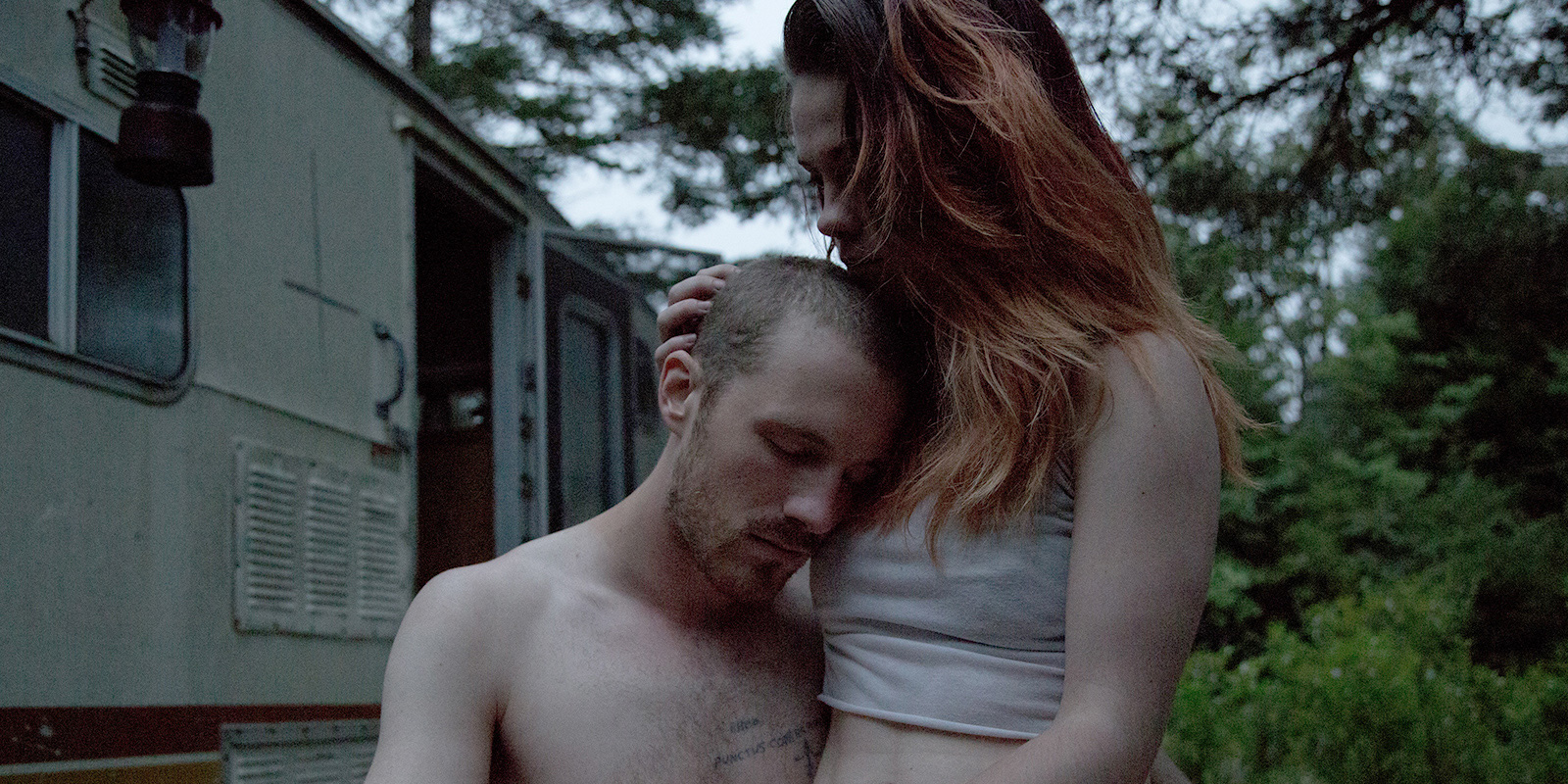Reviews include Civil War, In Flames, and The Greatest Hits.
Seeing the Future//Present
October 4, 2016
Last year, while working at the Vancouver International Film Festival, writer and programmer Adam Cook noticed a problem: Canadian film was changing, and Canadian festivals weren’t keeping up.

Whereas once the institutional model of filmmaking was the dominant mode of producing movies in Canada, now a new wave of independent Canuck filmmakers was emerging. To address this, Cook created Future//Present, a section at VIFF that spotlights new voices and visions from coast to coast to coast. The eight film programme is a wide ranging look at the coming generation of filmmakers in Canada: from Lev Lewis’ debut The Intestine to more familiar names like Randall Okita (The Lockpicker) and Karl Lemieux (Maudite Poutine). And while some films had already played festivals (Ashley Mackenzie’s Werewolf; Lawrence Côté-Collins’ Spilt), more than half are world premieres (Lights Above Water, Nicolas Lachapelle, Ariel St-Louis Lamoureux; Never Eat Alone, Sofia Bohdanowicz) or Canadian premieres (Tales of Two Who Dreamt, Andrea Bussmann, Nicolás Pereda). All suggesting that Cook has an eye for spotting—and supporting—new talents.
In the decompression period after TIFF, where they both work, Cook and Kiva Reardon talked over Skype about Canadian cinema and the work of programming versus being a critic.
Kiva Reardon: Tell about the section in your own words?
Adam Cook: Future//Present is an attempt to give a space to emerging Canadian filmmakers who are making films that are outside of normal avenues, both in terms of production and formally. A film in the program was really the impetus for it: Sofia Bohdanowicz’s Never Eat Alone. I fell in love with it immediately, but recognized that there wasn’t a space for it at VIFF as it existed at that point. The film is very small, modest, low budget—almost no budget—and operates in a docu-fiction space. I still felt there needed to be a space for this film and for others like it. More and more over the past few years, a lot of tremendous Canadian films are being made at this level, and it’s coming from a new generation of filmmakers.

KR: You’re touching on how film festivals play a role in a film’s life cycle, which also speaks to the festival landscape in general. Can you elaborate on this?
AC: The way festivals work is that they become set in a certain way once relationships are made and spaces are defined. There may be great curation, which there is at places like TIFF and VIFF. But it’s about the space—it’s a Field of Dreams thing, where if you build it they will come. Eventually what happens is that festivals dictate what kinds of films are seen and made. Things then get left out, not so much because of any issues on a curatorial level, but because of the design of the festival. That’s what needs to change. Cinema has changed so much; it’s cliché to talk about it at this point, but this is the point about how “anyone” can make films on digital cameras. At first, I was among the skeptics regarding this movement. I’m someone with really strong, classical formalist values. I think it took a generation of filmmakers working in that mode to come into their own and figure out how to make it work. And right now we’re seeing this wave, especially in the Canadian independent scene, of really assured, remarkable styles within those low-budget levels. Unless festivals change their architecture, then these films can’t be accommodated. We need to create those spaces for these films because otherwise they can’t compete against the status quo.
KR: In a Canadian context, this also brings up our “institutionalized” film history.
AC: Yes, and you can’t institutionalize a national cinema. That’s clearly what’s been attempted in our lifetime, and before, in Canada. It’s a dangerous notion. Now, that has worked at certain moments and for certain artists. There was a point, for instance, when the National Film Board of Canada was at the forefront of adopting new video technologies. But I feel like Canadian cinema, and I’m no real expert on this, has been too institutionalized and mandated from a higher power. Because of that, it’s been hard for filmmakers to establish themselves outside of that framework.

KR: It’s also interesting to think about it that yes, we’re having this wave across all cinemas. Mumblecore, for instance, shifted certain expectations of what a film looked like.
AC: Totally, and the landscape of world cinema has in a way liberated Canadian cinema from Canadian cinema.
KR: You also work as a film critic. How do you see this interplaying with your work as a programmer?
AC: The distinction between them is something I’m still trying to figure out, but it’s the same instincts and motivations. For me it’s about sharing films with audiences. In that regard, I think maybe film criticism is the more naïve pursuit. As a film critic, I write as an advocate. I try to avoid writing negative reviews unless I philosophically or morally feel obligated. I like to support filmmakers and interesting film. What I’m hoping to do as a critic is share an idea with a reader that will deepen their understanding or their connection to that film or filmmaker. Sometimes with writing, especially with how many things are being published online, I don’t how many people are really reading and just clicking Like or re-tweeting. That can be alienating, and with programming there’s the tangible connection to the audience which I find much more satisfying. But do I think criticism and programming come from the same gesture.
KR: I also think programming requires another skill set, which is envisioning other audiences. I might not like a film stylistically, or be used to how it’s made, but there’s definitely another audience that can appreciate it.
AC: Totally. I can only write film criticism in one register, which, to be hard on myself, is a bit elitist. And it’s a certain level that’s directed at a certain readership. Programming is about multiple audiences.

KR: You just moved from Vancouver to Toronto. What’s the shift been like when it comes to the film scenes?
AC: I love Vancouver, and the city has a lot of very talented filmmakers and dedicated cinephiles. But the sad thing is that it never coalesced into a proper film community. That might be because Vancouver is geared towards servicing the film industry, and especially the American film industry. I don’t think that artistry and independence are fostered, and that’s on institutional, governmental, and educational levels. I’ve spent my whole life in Vancouver and I’ve always felt very frustrated with that. When the opportunity came to move to Toronto, it was pretty impossible to say no. But it was hard to abandon what’s in Vancouver, and what I want to see and improve. So I wasn’t willing to make the move to Toronto if I couldn’t help in that regard, which is another reason Future//Present came about.
KR: Are you fed up with all the Drake jokes?
AC: It’s totally bizarre. Toronto’s identity is uniform. I have no idea what it means to be a Vancouverite, and to then go to a city that’s very confident, very assured, thinks it’s the only place and that has such a global icon, it’s surreal. In Toronto five cars drive by and they’re all playing Views. It’s not like we have that in Vancouver with Carly Rae Jepsen. It’s very weird to move to the “non-Canada Canada” to the “Canada-Canada.” I’m not a cynical person, but it’s a strange thing to go through.
KR: Well, the Leafs are terrible, so go Canucks.



